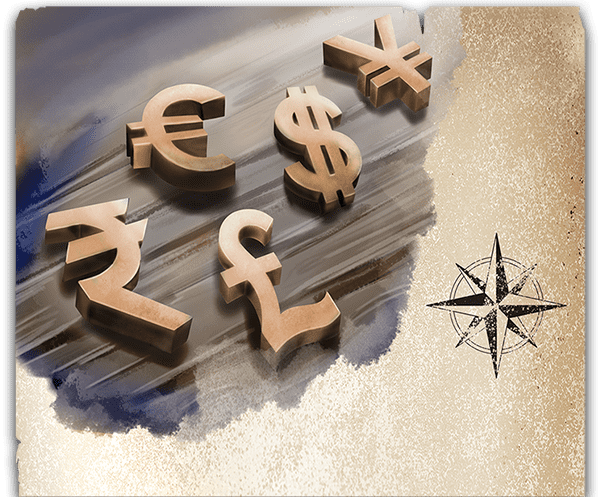Let’s see some of the best ways to pay for things in a European country without getting burned on the on fees and bad exchange rates. (Some of these principles will apply to other countries as well)
For starters though most countries in the west and center of Europe use the Euro. This makes things easy for traveling between these countries because you won’t need to change money every time you cross a border
But then, the UK uses the British Pound, Switzerland uses the Swiss franc, and then most of the Nordic and Eastern European countries also use their own currency. (This is just so you are aware and aren’t surprised when you drive from Austria to Czech Republic and find out that you cannot pay in Euros.
1.) Currency Exchange Booths
While this might be a convenient way to exchange your cash into a foreign currency, beware, the exchange rate they offer is usually low and you can end up losing a lot of money that you would like to use on your trip. Usually, you see these booths in airports or in the tourist areas of large cities. There is a reason they are stationed where they are, to make money off of tourists who need to exchange to get cash.
Basically, try to avoid these booths.
2.) Order Foreign Currency from your Bank
If you need cash before arriving at your destination you can always contact your bank about ordering foreign currency. Always check the exchange rate that they have, and see if there are any hidden fees or costs for delivery. Also, check how long it takes to get the foreign currency you need.
If you have time to plan before your trip and really need to have cash then this might be the way to go..
3.) Using your debit card
Generally most debit cards nowadays work when you travel. You can use them to make purchases or to withdraw cash from an ATM. (It’s safer and usually cheaper to use a bank ATM) Just check and see what costs your bank or the bank running the ATM charge in fees. It’s better to check this with your bank before traveling. Sometimes your bank will charge a specific fee of a few dollars or a certain set percentage of the money you take out. If it’s a set fee that doesn’t change with the amount you withdraw it’s probably better for you to withdraw larger amounts of cash less frequently to pay less fees.
Most debit cards are accepted in most stores across Europe (and elsewhere also), but some smaller retailers may not accept payment with a foreign debit card for small purchase of 1-5€. This is because the fees they may incur do not justify the sale. Just be prepared if you need to make small purchases.
Also some vendors at places like open-air markets may not accept cards, though more and more of them are as technology makes it easier for them to do so. In some countries the citizens prefer to use cash more than card. For example, Germans love to pay with cash and this can make for some uncomfortable situations at some small shops once you get away from the tourist areas. As the years go by though even these places are feeling the need to modernize.
Other countries such as in Sweden or Denmark hardly use cash anymore and are preparing to go cashless. So in countries like these you should have no problem getting around with just your card.
If you are asked if you want to make a payment in the local currency or $USD opt for paying in the local currency as you will better avoid bad exchange rates.
In general debit cards are a safe and easy way to get around and make purchases in Europe
(NOTE: Make sure to contact your bank before you travel to let them know that you will be abroad and in which countries. Otherwise it is possible that your account might be frozen if your bank thinks your information has been hacked or the card stolen.)
4.) Credit Cards
What about Credit cards? Well there are definitely some benefits to using them during travel. You can get some cards that have a 0% foreign transaction fee which makes shopping a bit more like at home (that is without extra fees). Also if your card is stolen the thieves don’t have private information which could help them access to your bank account.
You can also use the most credit cards to get money out at ATMs if you need some cash. Only thing is you aren’t withdrawing money from your bank account, its like you make a purchase with your credit card.
Often credit cards also give you points or rewards for when you spend, this can be useful for getting free flights or hotel rooms if you use the card a lot.
Of course it goes without saying that if you get behind on your payments an have to pay a lot of interest you might end up losing money and not saving. Then you might even be better of going and exchanging your cash at the airport. So be careful not to go over your budget!
(NOTE: Just like with a debit card make sure to contact your credit card company to let them know that you will be traveling and to which countries you will be traveling that you don’t have the inconvenience of having your card blocked.)




